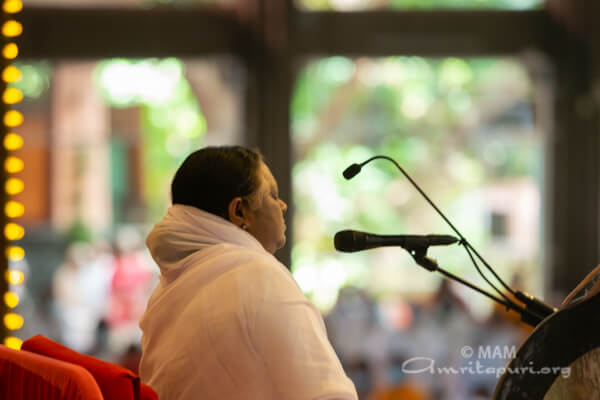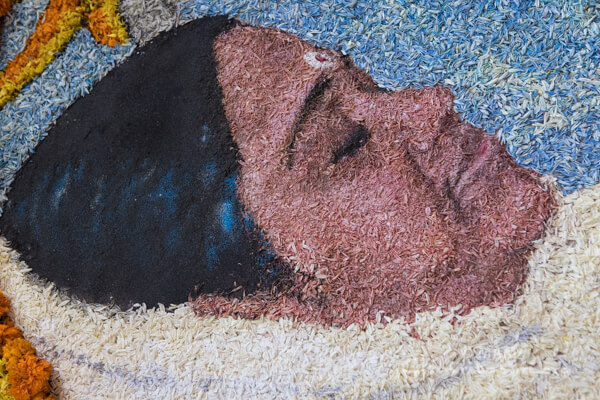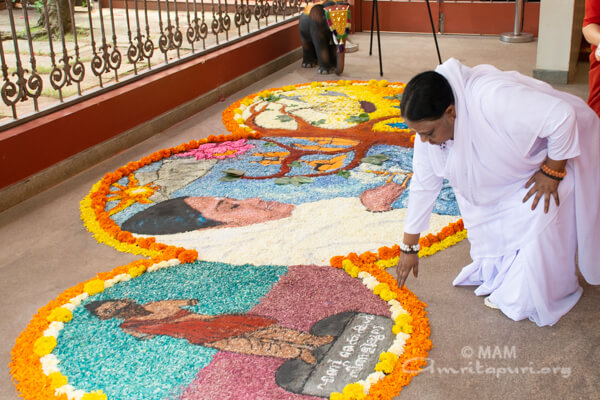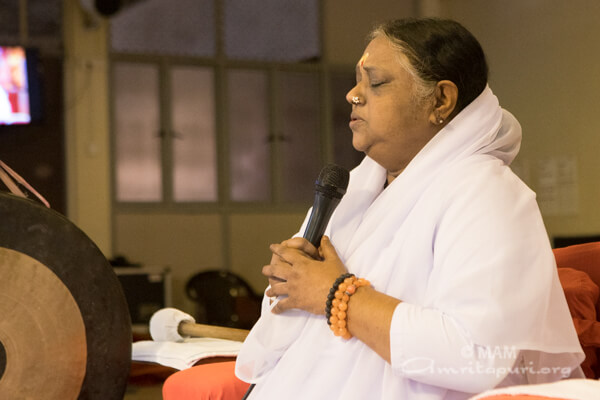21 Aug 2021, Amritapuri
Excerpts form Amma’s Onam message.
Onam is a time that transforms even the elderly into little children; it awakens the child in everyone. It is a time that everyone joins in the Onam games and celebrations and forgets everything else. It is a time when we remember that this world is a leela of the Lord. It is a time that gives the message that life is meant to be celebrated—that it is a time for us to laugh and be merry. It is a time when the joy and cheer that fills our heart also enthuses everything in Nature. It is a time when we openly express love and friendship to everyone. This attitude is the most special thing about Onam. Imagine a life where we are able to experience and sustain a mind filled with such goodness! If we are able to achieve such a mind, this earth would become heaven. Our life will become an endless celebration.
The real message of Onam is to understand that the essence of the universe is one and to do actions in the world firmly rooted in this principle. Then, peace, happiness and prosperity will come to us automatically. This is the lesson that the story of Mahabali teaches us. When we realise that the power that controls each and every aspect of this universe is the same, there will be no place left for the ego. All that will remain in us will be the deepest gratitude. Then, all we will do is humbly bow down and accept everything as a prasad from the Almighty. This is what Mahabali did.

Even after a year and a half of plaguing humanity, the coronavirus remains a horrific nightmare. All we can do is to find happiness, even in the middle of sorrow. We have to create that happiness. Amma doesn’t see any other way. Even when all doors are closed, we have to find a way out to escape. Just as a person surrounded by fire on all four sides will somehow find a way to escape, we should also fearlessly persevere and find a way out. Amma has seen many of her children crushed even by trivial disappointments. On the other hand, Amma also has seen children who face heavy burdens with a smile, all the while giving happiness to others. Amma has been seeing and hearing of their lives from letters and emails they have sent to Amma during this time.
Onam is an occasion for us to make ourselves happy and to make others happy. Not just Onam, but our entire lives should become like this.
In olden times, everything good was shared between households. If a mango tree in Amma’s yard had mangoes, it would be shared with the neighbouring six houses. The neighbours would do the same if their mango tree bore fruit. If a banana tree in the yard bore fruit, they would be shared with others first. Only what remained would be taken by the family. When we made pongal, we would share that; others would share theirs with us as well. Sharing all good things was the norm. If we visited the homes of relatives, they would give us some money when we left. It was meant to be for the journey. If we stayed there for a few days, then we would be given a new dress or something to take home with us. They considered it part of their dharma to regard us as their own children and to provide for us. They did not think of it as a burden. During Onam, it is customary to give something to those who help us, such as our maids and gardeners.
There is an old Malayaḷam saying, kanam viṭṭum Onam unnam (കാണം വിറ്റും ഓണം ഉണ്ണണം), which means that one must celebrate Onam even if he has to sell his land to do it. “Anpum, tumbum puratthe po! Avani Onam akette vaa!” അൻപും തുൻപും പുറത്തേ പോ ആവണി ഓണം അകത്തേ വാ [Anpu and Tumbum, go out! Avani Onam, come in!]. It means that love and sorrow should go out of us. Inviting Avani Onam means to invite happiness into our lives. ‘May the season change and may my heart become illumined,’ – this is the principle. It indicates inviting the culture of Onam and all its components, to come into us.
Onam is a festival that encompasses everything. When it rains incessantly during idavappati ഇടവപ്പാതി [monsoon from beginning of June], we say, “Oh, what a cursed rain!” People get tired of sitting indoors or getting wet in the rain. However, we fail to realise that it is this rain that makes our yards beautiful and sets the stage for the flowers to bloom and butterflies to flit during Onam. We forget that it was the blessing of the rain that made the dry land come alive and bloom. When we look at the fully bloomed flowers in the yard, we feel an unknown joy welling up within us. It is like looking at a picture of a laughing person—a smile will spontaneously play on our lips. So too just as looking at the picture of a grieving person spontaneously makes us sad. The bhava we perceive instinctively makes us slip into that bhava as well.

A beautiful Onam can take birth from the womb of our small disappointments and troubles. This realisation should become firmly rooted in us. Then we will be able to accept our little problems with the cheerfulness and contentment that accompanies the labour pain of childbirth. We will be able to accept it with the attitude of receiving prasad.
It is said that our sorrows will run away if we laugh out loud. Similarly, if we put in the right effort, even destiny will change its path. If we practise discernment in our life, even death will bid us farewell. If we are moving from a rented house to a beautiful house that we own, will we feel unhappy? In the same way, when we live with this attitude, death will not trouble us. We will be able to accept death with the same ease as a snake sheds its skin, as one walks from one compartment of a train into another, as one slips from waking state into sleep. We will have that courage.
Onam is a call to return to our culture and heritage, to an honest life, to the purity of Nature. Just as the plants and trees bring out the flowers hidden within, we should awaken the goodness within ourselves. We should give a little space for others in our life, and bow down before the God-consciousness that pulses through this earth and sky, and together try to make each day a Tiruvoṇam. May my children obtain the strength to achieve this! May grace bless everyone.




